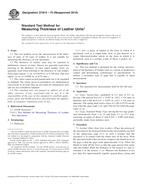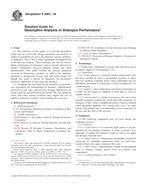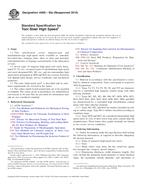1.1 This test method covers the determination of mechanical behavior of ultra-high molecular weight polyethylene (UHMWPE) by small punch testing of miniature disk specimens (0.5 mm in thickness and 6.4 mm in diameter). The test method has been established for characterizing UHMWPE surgical materials after ram extrusion or compression molding (1,2) ; for evaluating as-manufactured implants after radiation crosslinking and sterilization (3,4); as well as for testing of implants that have been retrieved (explanted) from the human body (5,6).
1.2 The parameters of the small punch test, namely the peak load, ultimate displacement, ultimate load, and work to failure, provide metrics of the yielding, ultimate strength, ductility, and toughness of UHMWPE under multiaxial loading conditions. Because the mechanical behavior of UHMWPE is different when loaded under uniaxial and multiaxial loading conditions (3), the small punch test provides a complementary mechanical testing technique to the uniaxial tensile testing specified for medical grade UHMWPE by Specification F 648.
1.3 In addition to its use as a research tool in implant retrieval analysis, the small punch test can be used as a laboratory screening test to evaluate new UHMWPE materials, such as those created by gamma or electron beam irradiation (1). The test method is also well suited for characterization of UHMWPE before and after accelerated aging (for example, Guide F 2003), and in that regard it can provide ranking of the mechanical degradation of different UHMWPE samples after oxidative degradation (4,7).
1.4 The small punch test has been applied to other polymers, including polymethyl methacrylate (PMMA) bone cement, polyacetal, and high density polyethylene (HDPE) (8,9). However, the small punch testing of polymers other than UHMWPE is beyond the scope of this standard.
1.5 The values stated in SI units are to be regarded as standard. The units in parentheses are mathematical conversions to inch-pound units that are provided for information only and are not considered standard.
1.6 This standard does not purport to address all of the safety concerns, if any, associated with its use. It is the responsibility of the user of this standard to establish appropriate safety and health practices and determine the applicability of regulatory limitations prior to use.
Product Details
- Published:
- 05/01/2008
- Number of Pages:
- 5
- File Size:
- 1 file , 100 KB


